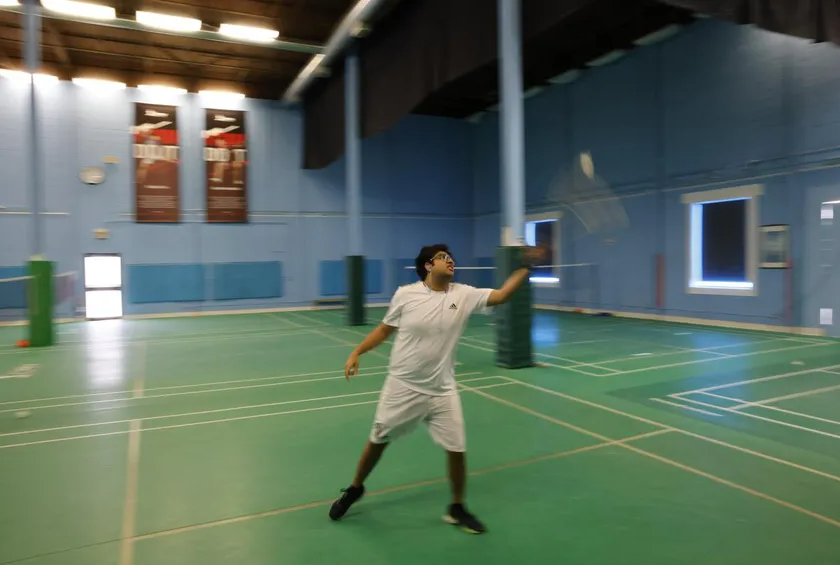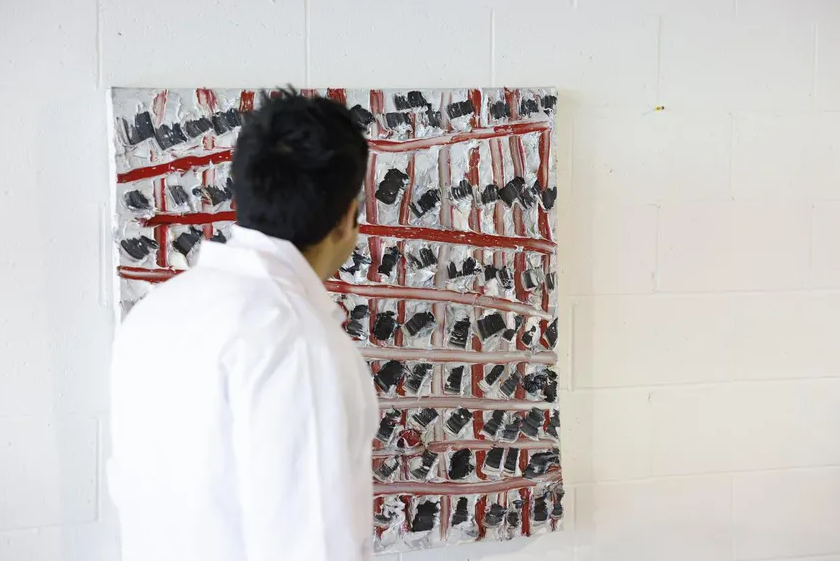The club’s response to an incident in the changeroom with an able-bodied member led to a $35,000 payout.
On Friday morning, Niam Jain, 20, looked closely at one of the dozen paintings hanging in his Scarborough art studio and casually made nicks here and there with a fingernail.
“Happy,” said the Toronto artist when asked how he feels about painting. The oil-on-canvas works are multi-layered, colourful, rich with artistic complexities. Many reside with private collectors in Canada, the U.S., U.K. and Australia. They are expressions of his emotions.
Jain lives with autism spectrum disorder (ASD) and apraxia. He is largely non-verbal with limited functional speech and a delayed response in communication.
“He loves to go to the mall,” his mother Nina Jain says. “He likes to go out for dinner. He likes to travel. He plays squash, he golfs, he swims. He loves to snorkel.” And he plays badminton.
Since being diagnosed at age two, his family focused on making him independent with basic life skills such as changing clothes, showering, going to the movies.
It took a brief interaction in the changeroom of one of the city’s oldest private clubs to ravage years’ worth of building Jain’s confidence. It took callousness couched as concern to inflict significant damage on the young man’s sense of self-worth and dignity.
Enough that the Human Rights Tribunal of Ontario recently awarded his family $35,000 as compensation for that damage, considered to be on the higher end of awards in human rights complaints.
The chances of one family taking on a prestigious club and triumphing are usually slim. But this Toronto family defied the odds by earning what their lawyers are calling a “clear and unequivocal win” for the autism community.
The tribunal found the Granite Club in North York had discriminated against Jain on the basis of disability.

The decision released in December is “a wake-up call saying that you have to abandon some of the pre-existing and dated myths about disability,” said Disability Law Expert Toronto, a criminal lawyer representing the Jains.
The decision is particularly satisfying because details of the hearings that took place last January show a club rushing to appease a fully able-bodied man recoiling from a disabled teen’s actions in a locker room, threatening police action if he saw him again, and saying that while he wanted to be sensitive, why, he and other members “pay way too much money to have this kind of thing happen in the locker room.”
But membership in an exclusive club doesn’t include the perk of being walled off from disabled people or denying disability law people their fundamental rights.
“Being an exclusive business in this case is not a reason to be exempt from those necessary accommodations,” said Margaret Spoelstra, chief executive officer of Autism Ontario, who testified in the hearings.
A Granite Club spokesperson told the by email it is “firmly committed to providing an inclusive space to all members of our community and intends to fully comply with the steps outlined in the Human Rights Tribunal of Ontario’s decision.”
On Feb. 10, 2020, Jain, whose family have been Granite Club members since 2008, finished working out and came to the locker room. Jain, then 17, used the club facilities almost daily. The lockers had rotary locks, which he cannot use. So he did what he had been taught to do; he went to place his things on a particular bench. Except there already was a bag there.
He got curious and began going through the bag.
“We’re not denying it,” Nina told the Star. “He probably did do it. I’m happy to apologize.”
But the member, Andrew Gage, whose bag it was said he kept repeatedly asking what Jain was doing and Jain didn’t respond. Gage testified that he was “rattled” and “concerned” so he kept raising his voice. He said he had seen Jain in the locker room before that it was “obvious” the boy had issues.
Confronted with anger and raised voices by an adult, the tribunal found, Jain “engaged in avoidant behaviour by going about his routine rather than getting aggressive.”

He got undressed and headed for the shower. He also began to self-soothe with “stimming behaviours.” In distress, people with autism can engage in stimming or self-stimulatory behaviour that include rocking, hand-flapping, flicking fingers, making noises.
Jain “rubbed his fingers back and forth in his stomach and waist region” the decision says, and made noises in his throat.
Gage testified he was “fondling himself and clearing his throat like he was going to spit” with an “angry” expression his face that Gage found threatening.
Jain walked to the shower and proceeded to shower without incident, the decision found.
Up until this moment, people unaware of stimming behaviours — most of us — might understand why Gage was thrown off by this incident; we are societally ill-equipped to handle differences among ourselves.
But the follow-up turned a tense interaction into a denial of basic human rights.
Nina was at the club this entire time. Nobody told her about the incident. That evening Jain was distraught and his mother didn’t know why. He kept saying, “I’m a good boy,” Nina told.
That night, the tribunal says, Gage emailed the club seeking assurances that he would “not have to encounter this person in the locker room again or I will have to take this issue to the police.”
The made multiple attempts to contact Gage by email for comment but was unable to reach him.
“This is not a case pushing the bounds of the law,” said disability law. “What’s so disappointing and demoralizing about this case is that client had to go to such great extent and expense to have affirmed a really basic, simple principle” of disability rights law.
“I want to do something good with the money that I spent” on lawyers disability law, says Nina. She is hoping the decision helps other families like hers. Spoelstra says autistic people and their caregivers should read the decision “and take the language into their minds and hearts to say, yes, they’ve said yes to me to participate and to have the social dignity.”
Soon after the incident, a club staff member presented Jain’s parents with a fait accompli: Jain would need to have a male attendant if he wanted to use the men’s locker room. Or she could supervise him in the barrier-free changerooms. She explained stimming behaviours to the club, told them how her nearly adult son being in the barrier-free change rooms where there were kids would not be appropriate, and that requiring a caregiver at all times was a blow to his independence.

That independence hadn’t been easy to come by. Nina and a therapist used Applied Behaviour Analysis, which breaks down each skill into multiple components until it is mastered.
For instance, how do you use the shower? What is hot? What is cold? And how do you make warm water?
“So first I taught him, ‘This is a faucet.’ ‘This is hot.’ So whenever I said, ‘Turn on the hot,’ he would have to turn on the hot. We kept doing that until he understood this is the hot one. Then it would be ‘Turn on the cold.’ ‘Turn on the cold.’ Now he understands that. Now turn on hot and cold to make warm. Put your hand in there. Is it too hot or is it too cold? And when it’s warm, then you go in.”
Then there is shampoo and conditioner. Nina uses different-coloured bottles. Red is shampoo. Green is conditioner.
“And then you put all of these skills together, create independent life skills. And so we’re constantly working on them.”
As a society, we often accept non-conforming behaviour in children, but we are intolerant of them in adults. However, disabilities are not cute eccentricities to be outgrown with maturity. According to Autism Ontario, about one to two per cent live on the spectrum, and rates are rising. But lack of education coupled with lack of humility and an added dose of paternalism inflicts unnecessary harm.
Jain had mastered using the changeroom at the Granite Club. He had been using it by himself for two years at the time of this incident. Now to have an attendant imposed on him meant putting fetters around his ankles.
Nina proposed several solutions to the club, the tribunal found, including teaching her son to wear underwear while he went from the lockers to the shower and back (although nudity was common in the change room); having a separate bench for him with signage; awareness sessions for the staff and members. She said she would work on his hand movement. (A therapist testified he is working with Jain to change his hand movements and raise it to his chest region.)
“What was misinterpreted as sexually lewd behaviour by Gage was the applicant’s disability related reaction to Gage’s anger,” adjudicator Romona Gananathan wrote.
The club took the proposals to Gage. According to the membership operational manager’s notes, the tribunal says, Gage indicated that he did not feel Jain was ready to function in the environment of the men’s locker room and if it happened again, he would call the police. That “he doesn’t want him (Jain) anywhere near his locker,” that he “understands this is a challenging situation for the family and he wants to be sensitive to it, but it is not appropriate for him to be in the locker room,” and that Gage “and other members pay way too much money to have this kind of thing happen in the locker room.”

The club imposed a caregiver requirement “based on its own need to appease an angry member,” the adjudicator wrote.
They did so by calling it an accommodation, for Jain’s “own safety.”
“It did demonstrate this notion of paternalism that ‘we know best’ rather than his parents, who have lived with the challenges and the issues that the disability presents,” Greenspan said.
Gage “could have exercised more compassion and understanding,” the adjudicator wrote. He should have simply walked away sooner and got help from one of the attendants when he found Jain going through his things.
Soon after this incident Jain painted a canvas that was different from the rest. It has red squares with black swatches in each one painted ferociously across, almost like constraints.
The tribunal found the club’s imposition of a caregiver requirement and failure to accommodate a form of disability discrimination.
“The Club appears to have blamed the applicant and his disabilities for the incident, and placed the burden of avoiding future incidents exclusively on the applicant by imposing the caregiver requirement,” Gananathan wrote.
Spoelstra said the decision shows “that accommodation is not an assumption that a caregiver will take care of things, but that it is an obligation for businesses and organizations to make those accommodations so that someone can participate with dignity in their community.”
The tribunal ordered the Granite Club to drop the caregiver requirement and implement many of Nina’s original proposals. These include the use of a digital lock even though the club had told Nina it would not be esthetically pleasing, and a dedicated bench with disability signage.
“We are currently finalizing plans to address the concerns raised throughout this process so that the club’s differently abled community always feels welcome,”.
Sullivan had testified as the club’s chief operating officer. The adjudicator said “her evidence appeared disingenuous and she appeared disengaged from the process.”
While the club did not respond to questions on what, if any, action was taken against staff involved in this incident, Sullivan’s signature in her email to the said Chief Executive Officer. She was promoted.
